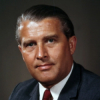Wernher von Braun

Wernher von Braun
Wernher Magnus Maximilian Freiherr von Braunwas a German, later American, aerospace engineer and space architect credited with inventing the V-2 rocket for Nazi Germany and the Saturn V for the United States. He was one of the leading figures in the development of rocket technology in Nazi Germany, where he was a member of the Nazi Party and the SS. Following World War II, he was moved to the United States, along with about 1,500 other scientists, technicians, and engineers,...
NationalityGerman
ProfessionScientist
Date of Birth23 March 1912
CityWyrzysk, Poland
CountryGermany
If we continue at this leisurly pace, we will have to pass Russian customs when we land on the moon.
The greatest gain from space travel consists in the extension of our knowledge. In a hundred years this newly won knowledge will pay huge and unexpected dividends.
It takes sixty-five thousand errors before you are qualified to make a rocket.
For me, the idea of a creation is not conceivable without invoking the necessity of design. One cannot be exposed to the law and order of the universe without concluding that there must be design and purpose behind it all.
The best computer is a man, and it’s the only one that can be mass-produced by unskilled labor.
There is beauty in space, and it is orderly. There is no weather, and there is regularity. It is predictable. Just look at our little Explorer; you can set your clock by it-literally; it is more accurate than your clock. Everything in space obeys the laws of physics. If you know these laws, and obey them, space will treat you kindly.
With our present knowledge, we can respond to the challenge of stellar space flight solely with intellectual concepts and purely hypothetical analysis. Hardware solutions are still entirely beyond our reach and far, far away.
The logistic requirements for a large, elaborate mission to Mars are no greater that those for a minor military operation extending over a limited theatre of war.
My friends they were dancing here in the streets of Huntsville when our first satellite orbited the Earth. They were dancing again when the first Americans landed on the Moon. I'd like to ask you, don't hang up your dancing slippers.
A good engineer gets stale very fast if he doesn't keep his hands dirty.
I'm convinced that before the year 2000 is over, the first child will have been born on the moon.
There is just one thing I can promise you about the outer-space program - your tax-dollar will go further.
The first men who set out for Mars had better make sure they leave everything at home in apple-pie order. They won't get back to earth for more than two and a half years. The difficulties of a trip to mars are formidable. . . . What curious information will these first explorers carry back from Mars? Nobody knows-and its extremely doubtful that anyone now living will ever know. All that can be said with certainty today is this: the trip will be made, and will be made . . . someday.
One good test is worth a thousand expert opinions.